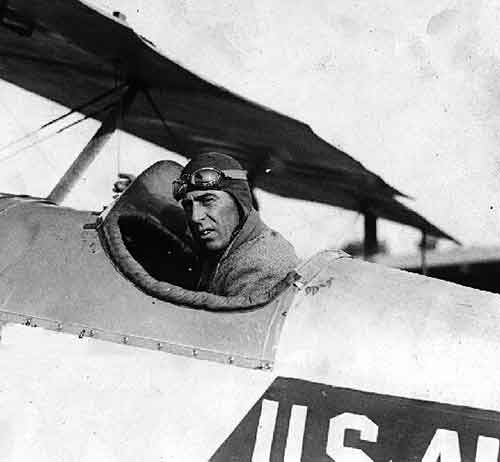January 7, 1919 – Cleveland, Ohio
March 16, 1919 – Bustleton Field, Pennsylvania
November 24, 1920 – College Park, Maryland
January 16, 1921 – Chicago, Illinois

- Courtesy of the Air Mail Pioneers
Carroll "Mickey" Eversole may have been a good airmail pilot, but he made a serious miscalculation during his service. On February 18, 1921, he was flying a dreaded twin de Havilland airplane from Minneapolis, Minnesota, when shortly after takeoff, and using a parachute, he bailed out of the airplane. A Chicago newspaper which wrote excitingly of this event, the first airmail pilot to survive a jump from a mail airplane, noted that the chute was "one of his own making." Other witnesses remembered Eversole taking time to examine the parachute in detail before taking off. Officials investigated the crash and determined that Eversole had used the event to publicize the new parachutes, destroying an airmail airplane in the meantime. Eversole was quickly fired. His fellow pilots had mixed feelings about Eversole's stunt. Few thought what he did was right, but none of them were sad to see a twin de Havilland airplane smashed into pieces.
Eversole did not leave quietly. His vocal, public complaints over conditions at the Chicago, Illinois airmail field after his dismissal (which Eversole claimed was due to his investigation of conditions) brought him back to the attention of airmail officials. Among the charges Eversole made in May 1921 were complaints that airmail mechanics staff at Checkerboard Field in Chicago held late night drunken parties that affected their ability to maintain their aircraft. The charges came on the heels of the deaths of five airmail pilots, and caught public and congressional attention.
Eversole was asked to testify before Congress and on March 13, 1921. There he charged that 13 men had been killed in the Air Mail Service because of "gross mismanagement, inefficiency and criminal negligence." Included in the evidence were affidavits from several pilots and mechanics then in the service, all of which corroborated Lieutenant Eversole's charges, and a statement written by Pilot J. P. Christensen previous to his death in a fall at Cleveland, Ohio.

Learn more »
Eversole's testimony went into detail as to the deaths of the thirteen aviators, and gave his explanations for these fatalities. He listed Pilot Carl Smith, killed at Elizabethtown, New Jersey; Pilot Stoner, killed at Goshen, Indiana; Pilot Bryan McMullin, killed at Batavia, Illinois; Pilot Sherlock, killed at Newark, New Jersey; Pilot Max Miller and Mechanic Pierson, killed at Morristown, New Jersey; Pilots Stevens and Thomas, killed in Ohio; Pilots Rowe and Carrol and Mechanic Hill, killed at La Crosse, Wisconsin; Pilot Stewart, killed near Minneapolis; and Pilot J. P. Christensen, head of the Air Mail Pilots' Association.
The testimony and evidence presented by Lieutenant Eversole alleged that attempts had been made by field officials to "get" Christensen and force him out of the service because of work in organizing the Pilots' Association, and because he was known to be gathering proof of alleged negligence by officials.
Not all of Eversole's fellow pilots supported his charges. Pilots J. O. Webster, Claire Vance, Tex Marshall, Paul Collins, C. Eugene Johnson, William C. Hopson, W. Williams and L. H. Garrison each stated that they knew of no case in which pilots had "been requested ordered to take chances with faulty airplanes or unsettled weather."
Congressional and postal officials found enough validity in some of Eversole's claims to fire some of the airmail service managers at Checkerboard field.

Newspaper clipping from June 1, 1921 New York Times reporting Eversole's testimony against some of the managers and ground crew at Chicago's Checkerboard Field.
The following article was printed in the New York Times on June 1, 1921.
Air Mail Chiefs Ousted at Chicago After Inquiry into Deaths of 5 Pilots
CHICAGO, May 31.—E. W. Majors, Superintendent of the Chicago Division of the Air Mail, was relieved from duty on orders from Washington today following a month's investigation by postal inspectors.
Assistant Superintendents W. S. Moore and Paul V. King and Field Manager Paul Dumas also were relieved from duty "pending further instructions." C.A. Parker was appointed temporary chief of division in Majors's place.
The investigation into conditions at Checkerboard Field followed the deaths of five pilots in the Chicago division in the last few months. Charges of inefficiency, negligence and drunkenness were made by witnesses during the inquiry. . . . All of these charges were strongly denied by the accused officials, whose conduct also was defended by pilots at the field.
The chief witness before the investigation board was C. C. Eversole, former air mail pilot, who was discharged from the service after he had made a parachute leap from his airplane near Minneapolis last February. Eversole asserted this was necessary to save his life, but officials who investigated declared his leap, which resulted in the destruction of his airplane, was unnecessary.
Eversole declared that the real reason for his discharge was that he had told postal inspectors of neglect and inefficiency at mail flying fields.
In addition, he asserted, that air field officials staged drinking parties which incapacitated them for the day.
In the case of J. P. Christensen, head of the Air Mail Pilots' Association, who was killed when his airplane crashed in a fog at Cleveland, Eversole testified that attempts had been made by officials to force Christensen out of the service because of his work in organizing the Pilots' Association and because it was known that he was gathering proof of alleged negligence by officials."
